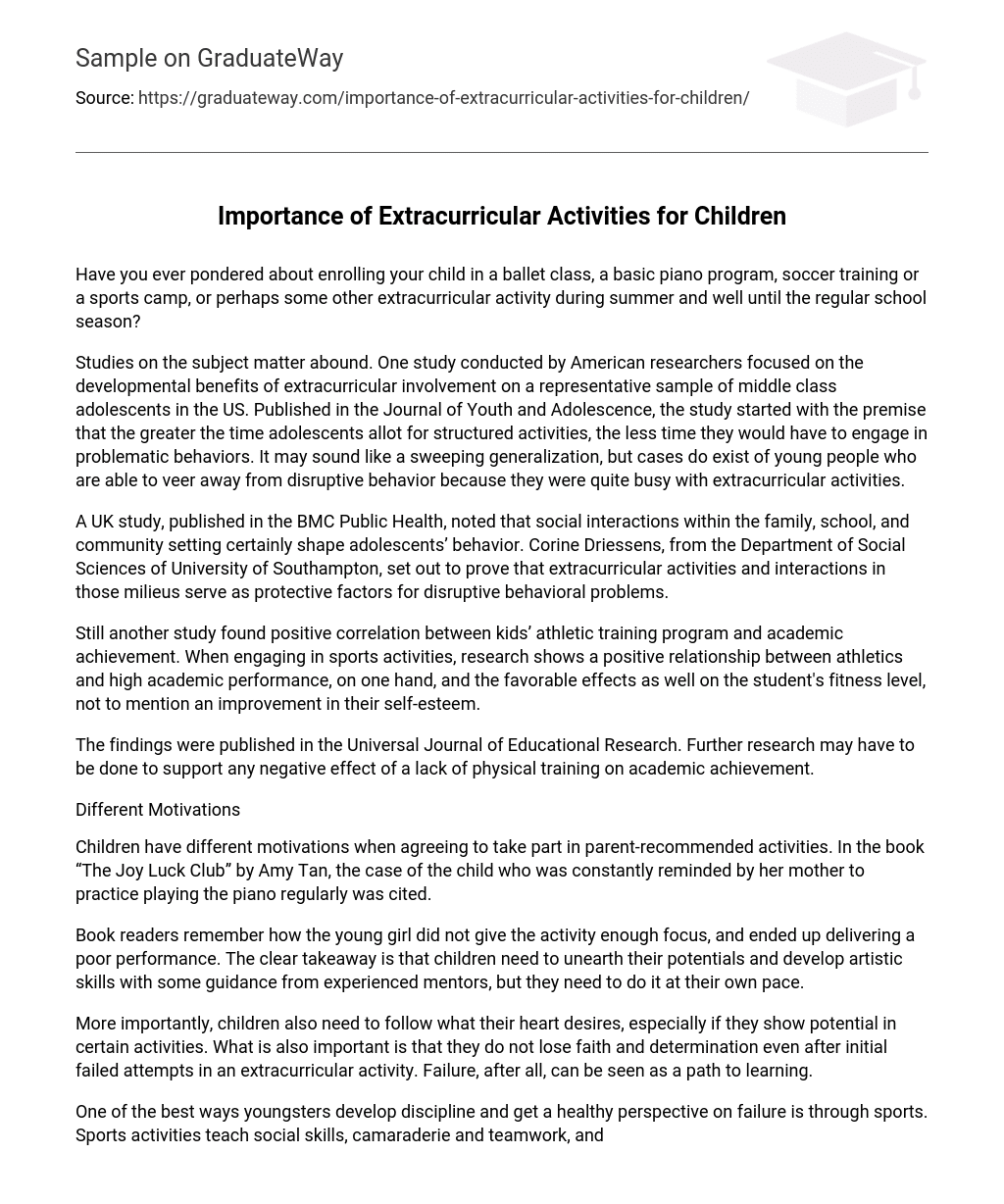Have you ever pondered about enrolling your child in a ballet class, a basic piano program, soccer training or a sports camp, or perhaps some other extracurricular activity during summer and well until the regular school season?
Studies on the subject matter abound. One study conducted by American researchers focused on the developmental benefits of extracurricular involvement on a representative sample of middle class adolescents in the US. Published in the Journal of Youth and Adolescence, the study started with the premise that the greater the time adolescents allot for structured activities, the less time they would have to engage in problematic behaviors. It may sound like a sweeping generalization, but cases do exist of young people who are able to veer away from disruptive behavior because they were quite busy with extracurricular activities.
A UK study, published in the BMC Public Health, noted that social interactions within the family, school, and community setting certainly shape adolescents’ behavior. Corine Driessens, from the Department of Social Sciences of University of Southampton, set out to prove that extracurricular activities and interactions in those milieus serve as protective factors for disruptive behavioral problems.
Still another study found positive correlation between kids’ athletic training program and academic achievement. When engaging in sports activities, research shows a positive relationship between athletics and high academic performance, on one hand, and the favorable effects as well on the student’s fitness level, not to mention an improvement in their self-esteem.
The findings were published in the Universal Journal of Educational Research. Further research may have to be done to support any negative effect of a lack of physical training on academic achievement.
Different Motivations
Children have different motivations when agreeing to take part in parent-recommended activities. In the book “The Joy Luck Club” by Amy Tan, the case of the child who was constantly reminded by her mother to practice playing the piano regularly was cited.
Book readers remember how the young girl did not give the activity enough focus, and ended up delivering a poor performance. The clear takeaway is that children need to unearth their potentials and develop artistic skills with some guidance from experienced mentors, but they need to do it at their own pace.
More importantly, children also need to follow what their heart desires, especially if they show potential in certain activities. What is also important is that they do not lose faith and determination even after initial failed attempts in an extracurricular activity. Failure, after all, can be seen as a path to learning.
One of the best ways youngsters develop discipline and get a healthy perspective on failure is through sports. Sports activities teach social skills, camaraderie and teamwork, and sportsmanship, while also improving mental and physical health.
Lowdown on Packing a Child’s Schedule with Extracurricular Activities
Having one activity or two for a child to focus on may be energizing and inspiring. However, if a child’s schedule is too crammed with activities that a parent feels may be suitable, the youngster may end up too exhausted and unhappy.
The upside of engaging in a wholesome activity like sports or dance, apart from improving physical and mental states of children, is that they enable the kids to make quality friends who they share common interests with.
Overscheduling activities for older kids aged eight and above can have pitfalls. Parents who unwittingly press their kids to do as many things as they can may be reflecting their own beliefs or modeling their own habits.
Elders and mentors should remind children that being busy every minute of their lives need not be their mission. They need to draw attention, instead, to the benefits of having unstructured time. Moreover, parents can put emphasis on the more important things — like development of young people’s character, and the fact that they are valued not merely for their accomplishments (whether in the academic or extracurricular realm).
The other dangers of overscheduling activities for kids is that it can give rise to stress-related symptoms ranging from headaches and digestive problems to anxiety and depression, sleeping disorders, and other physical manifestations apart from sheer exhaustion.
There are, indeed, pros and cons when it comes to children’s participation in extracurricular activities. If they happen to be intrinsically interested in the activities they have started exploring on their own free will, then children are bound to reap the benefits and find opportunities to grow and develop traits like persistence, and focus, and work on their identity-building along the way.
There continue to be cases wherein sports activities for children are planned as highly organized affairs. When children cease to find enjoyment in such ‘highly organized affairs’ mapped out by their parents, then they may just drop out sooner or later and miss out on the advantages that come with taking part in wholesome outdoor recreational activities.





